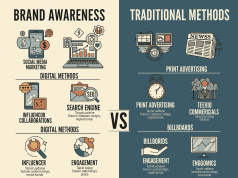In today’s fast-paced digital landscape, small businesses face unique challenges and opportunities. With limited resources and budget constraints, adopting the right digital marketing tools can be the game-changer that propels your business to new heights. Here’s a comprehensive guide to essential digital marketing tools that every small business should consider to enhance online presence, improve customer engagement, and drive sales.
1. Website Builders: The Foundation of Your Online Presence
The first step in digital marketing is establishing a robust online presence. Website builders like Wix, Squarespace, and WordPress offer user-friendly interfaces to create professional websites without requiring coding expertise. These platforms often come with templates tailored for small businesses, enabling you to showcase your products and services effectively.
Key Features:
- Drag-and-drop functionality
- SEO optimization tools
- Mobile responsiveness
2. Social Media Management Tools: Building Your Brand
Social media is an essential channel for engaging customers and building brand awareness. Tools such as Hootsuite, Buffer, and Sprout Social allow you to manage multiple social media accounts from a single dashboard. This can enhance your consistency and frequency of posts, helping you to engage with your audience more effectively.
Key Features:
- Scheduled posting
- Social media analytics
- Audience engagement tracking
3. Email Marketing Services: Nurturing Customer Relationships
Email marketing remains one of the most effective ways to communicate with your audience. Platforms like Mailchimp, Constant Contact, and Sendinblue facilitate the creation and management of email campaigns, allowing you to nurture leads and drive conversions.
Key Features:
- Segmentation of audiences
- A/B testing capabilities
- Automated workflows
4. SEO Tools: Enhancing Visibility in Search Engines
Search engine optimization (SEO) is crucial for getting found online. Tools such as SEMrush, Moz, and Ahrefs provide insights into keywords, backlinks, and competitor strategies. These insights help you optimize your website and content for better visibility on search engines.
Key Features:
- Keyword research
- Site audits
- Competition analysis
5. Content Creation and Design Tools: Catching Your Audience’s Eye
High-quality content is essential for engaging your audience. Tools like Canva for graphic design, Grammarly for writing assistance, and Piktochart for infographics can help you create visually appealing and error-free content.
Key Features:
- Template libraries
- Collaboration features
- Easy export options
6. Analytics Tools: Measuring Success
Understanding the effectiveness of your marketing efforts is vital. Google Analytics and Facebook Insights provide valuable data on website traffic, user behavior, and campaign performance. Leveraging analytics allows small businesses to make data-driven decisions and refine their marketing strategies.
Key Features:
- Real-time data tracking
- Custom reporting
- Goal tracking
7. Customer Relationship Management (CRM) Systems: Managing Client Interactions
A CRM system helps streamline your interactions with customers, manage relationships, and improve retention rates. Tools like HubSpot, Zoho CRM, and Salesforce can help you track leads, manage customer data, and automate follow-ups.
Key Features:
- Contact management
- Sales pipeline tracking
- Integration with other marketing tools
8. E-commerce Platforms: Selling Online
For small businesses looking to sell products or services online, platforms like Shopify, WooCommerce, and BigCommerce provide comprehensive solutions to manage online stores, payments, and inventory.
Key Features:
- Customizable online storefronts
- Secure payment gateways
- Inventory management tools
Conclusion
Navigating the digital marketing landscape can be daunting for small businesses, but with the right tools at your disposal, success is within reach. Utilizing a combination of website builders, social media management tools, email marketing services, and analytics will help you build a strong online presence, engage your audience effectively, and drive sales.
Investing time and resources in these essential digital marketing tools will become a strategic advantage, allowing you to compete in a crowded marketplace. Embrace the power of digital marketing, and watch your small business thrive!









